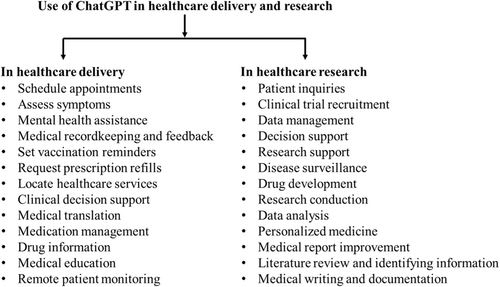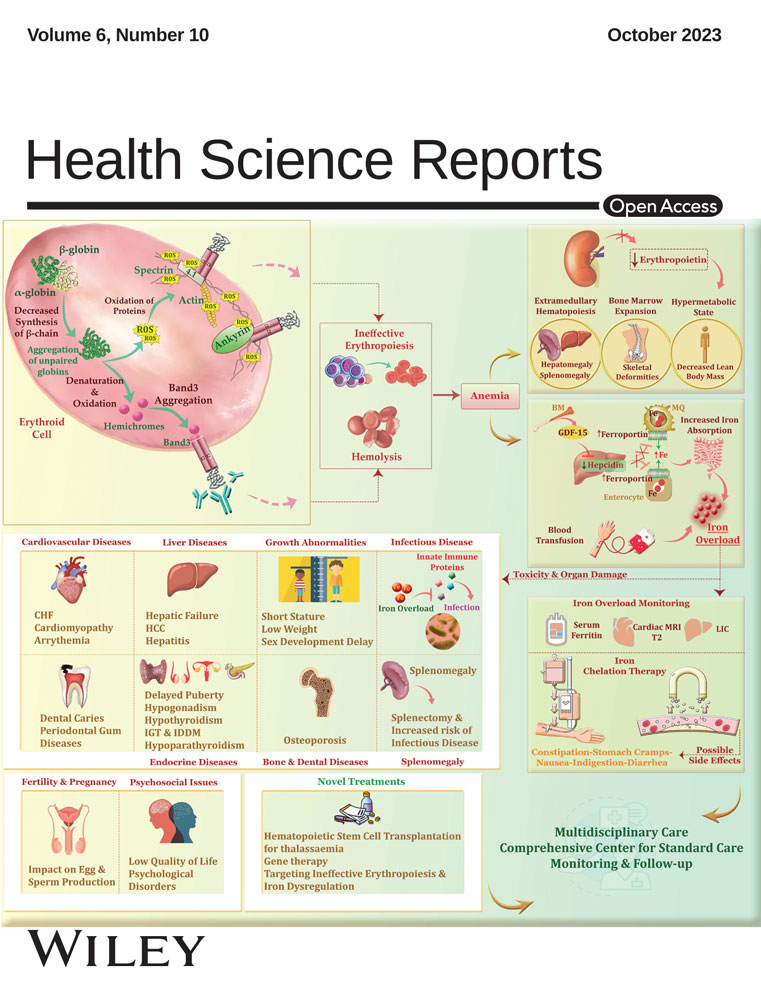Role of ChatGPT in health science and research: A correspondence addressing potential application
ChatGPT is an artificial intelligence (AI)-powered chatbot designed to respond to a wide variety of questions and topics, from simple queries to complex discussions. It uses natural language processing to understand what people are saying and respond appropriately. ChatGPT is a great tool for people who want to learn new things, get information, or just have fun chatting with a friendly AI. It can provide information on a wide range of topics, from science and technology to entertainment and current events. ChatGPT can provide personal recommendations based on user preferences and interests, making it a great tool for discovering new things. ChatGPT helps users with tasks such as setting reminders, scheduling appointments, and making reservations. It can also provide guidance on topics such as health and wellness, finance, and career development. With its advanced technology and user-friendly interface, ChatGPT is a great way to explore the world of AI and have interesting conversations.1
ChatGPT has the potential to revolutionize the healthcare industry by providing a wide range of services related to diagnosis, monitoring patient health, medicine, patient engagement, healthcare delivery, health research, and more (Figure 1). Additionally, it can provide users with resources and support for mental health issues such as anxiety and depression, as well as offer guidance on stress management, mindfulness exercises, and relaxation techniques. The use of chatbots in suicide prevention and cognitive-behavioral therapy is noteworthy, potentially offering virtual therapy to individuals hesitant to consult a therapist directly. In contemporary times, various software programs use search history and online behavior to personalize advertisements.2 Similarly, chatbots can utilize these insights to potentially recognize patterns indicative of suicidal tendencies. This proactive strategy could facilitate prompt intervention and assistance for those in need. This technology's increasing accessibility and ease of use have led some to consider it “the future of therapy.” Moreover, chatbots like ChatGPT may overcome barriers such as cost-extending treatment for psychological issues.3 ChatGPT can engage patients by providing personalized health tips and advice, as well as motivational messages to encourage healthy behaviors. This can help patients take a more active role in managing their health and improve their overall well-being.4

ChatGPT helps patients manage chronic diseases, such as diabetes, hypertension, stroke, cardiovascular disease, cancer, skin disease, and neurological disorders, by providing information, personalized recommendations for medication, and lifestyle changes, which can help them manage their symptoms and improve their quality of life. ChatGPT helps patients stay connected with their healthcare providers, which can improve communication and collaboration between patients and providers. To cope with the emotional and psychological challenges of living with chronic disease. ChatGPT helps patients access resources and support groups.5 ChatGPT can provide users with information about prescription drugs, their uses, and potential side effects. It can also help users track their medication schedules and set reminders to take their medication on time.6 ChatGPT can help patients monitor their health by tracking vital signs such as blood pressure, heart rate, and blood sugar levels. This data can be shared with healthcare professionals, who can use it to make more informed decisions about patient care. It can also provide users with information about healthy eating habits, including meal planning, portion control, the importance of a balanced diet, personalized workout plans, and fitness tips, as well as motivation to help them stick to their goals.7, 8 ChatGPT can analyze patient data and different clinical test results and provide preliminary diagnoses based on symptoms, medical history, and other factors using its large database, which is exponentially growing day by day. As a result, the precision of the diagnosis will increase proportionally. This can help healthcare professionals make more informed decisions and provide better care to their patients. ChatGPT can facilitate telemedicine consultations between patients and healthcare professionals, allowing patients to receive medical care from the comfort of their own homes in a faster and more precise manner by using previous records.8, 9
ChatGPT can play a significant role in health research by providing a platform for data collection, analysis, and interpretation. ChatGPT can be used to generate an anonymous database by collecting data from patients without mentioning their identity, healthcare providers, and researchers on various health-related topics, such as medication adherence and disease prevalence. This data can be used to identify trends, patterns, and potential risk factors for various health conditions, inform research studies, and improve healthcare outcomes. It can also be used to collect patient-reported outcomes, which can help researchers better understand the patient experience.10 ChatGPT can be used to analyze large data sets, which can help researchers identify correlations and associations between variables. It can be used to develop predictive models, which help researchers identify patients who are at risk of developing certain health conditions. Besides, ChatGPT can engage patients in research studies. Patients can provide feedback on the study design, participate in focus groups, and they can provide input on research questions generated by the ChatGPT using the previous database on prevalence and comorbidity patterns, and update the existing database. This database can help researchers ensure that their studies are patient-centered, use the most recent disease prevalence, and address the needs and concerns of patients.10, 11
ChatGPT can provide access to educational materials, training modules, and other resources that can help improve health literacy and promote evidence-based practice. ChatGPT is used to educate patients, healthcare providers, and researchers about various health conditions. It can be used to conduct surveys to collect data on various health-related topics, such as patient satisfaction, healthcare utilization, and health behaviors. These surveys can provide valuable insights into patient experiences and preferences, which can be used to improve healthcare services and outcomes.12 ChatGPT can be used to develop and test interventions for various health conditions. Researchers can use ChatGPT to develop and test digital health interventions, such as mobile apps, chatbots, and other digital tools. These interventions can be designed to improve patient outcomes, increase patient engagement, and promote behavior change. By leveraging the power of ChatGPT, researchers can gain valuable insights into various health-related topics, which can be used to develop more effective healthcare policies and interventions. Besides, researchers can improve our understanding of health and disease and develop new and innovative approaches to improving patient outcomes.1
In addition to ChatGPT, AI has made notable advancements in revolutionizing healthcare across several fields. Clinical Decision Support systems have been found to improve adherence to clinical guidelines. Precision or personalized medicine, on the other hand, customizes treatment approaches by considering an individual's genetic information. The utilization of image analysis techniques has been shown to lessen discrepancies in the interpretation of medical images. Furthermore, the rapid expansion of the Internet of Things has facilitated the deployment of AI in various patient contexts. AI technologies have a significant influence on many practices within the field of Health Information Management (HIM). The aforementioned factors encompass the automation of medical coding and data collection, effective administration of healthcare data, strong data governance, protection of patient privacy and confidentiality, and the advancement of training and education for the HIM workforce.5, 13, 14
AI in health and health research has limitations that need to be addressed. Ethical issues arise as AI systems may not always prioritize the patient's best interests. Inappropriate responses may occur if the AI system is not properly trained or lacks the necessary data to make an informed decision. The lack of standards to assess the safety and efficacy of AI systems can lead to uncertainty in the results. Data exchange can be a concern as data may be sold or marketed by companies. To overcome aforementioned limitations, AI systems need to be transparent and accountable, with clear guidelines on how they operate. Data privacy and security must be a priority, and patients must have control over their data. AI systems should be regularly audited to ensure they are functioning as intended. A multidisciplinary approach can improve healthcare chatbot efficacy and believability despite limited technology availability and input manipulation. This includes phone, SMS, and in-person access. Digital literacy programs empower patients, while user-friendly interfaces help individuals unfamiliar with technology. Multilingual support ensures communication inclusivity. Human-assisted chatbots are reliable hybrid solutions. Being upfront about chatbot limitations and encouraging truthful feedback helps preserve accuracy. Although ethical rules assure correct use, validation procedures validate responses. Feedback-driven refinement and strong privacy protections boost user trust. These tactics can help healthcare providers and developers overcome technology challenges and make chatbot services accessible, trustworthy, and valuable to all users. To use AI more appropriately, AI systems should be designed with the patient's best interests in mind. They should be used to augment, not replace, human decision-making. AI should be used to improve the accuracy and efficiency of diagnoses, treatment plans, and drug development. Overall, AI has the potential to revolutionize healthcare, but it must be used responsibly and with care.
AUTHOR CONTRIBUTIONS
Md. Rabiul Islam: Conceptualization; supervision; writing—review and editing. Taslima Jamal Urmi: Conceptualization; data curation; writing—original draft. Rana Al Mosharrafa: Conceptualization; data curation; writing—original draft. Mohammad Saydur Rahman: Conceptualization; supervision; writing—review and editing. Mohammad Fahim Kadir: Conceptualization; supervision; writing—review and editing.
CONFLICT OF INTEREST STATEMENT
The authors declare no conflict of interest.
TRANSPARENCY STATEMENT
The lead author Md. Rabiul Islam affirms that this manuscript is an honest, accurate, and transparent account of the study being reported; that no important aspects of the study have been omitted; and that any discrepancies from the study as planned (and, if relevant, registered) have been explained.
Open Research
DATA AVAILABILITY STATEMENT
Data available on request from the authors.




